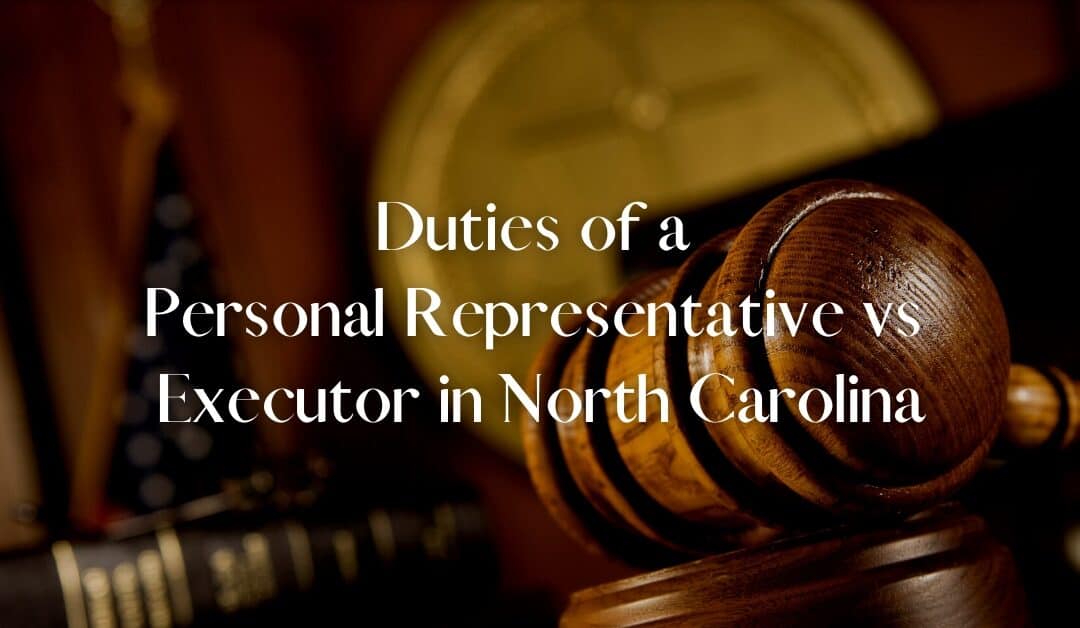When a loved one dies, the process of settling their estate can be confusing. This is because many terms used by the judicial system may be unfamiliar to those who don’t know probate law. In this blog post, we will look at the duties of a personal representative vs executor to help you understand the role of each in settling an estate. We’ll also discuss how the court appoints personal representatives and executors and what happens once appointed.
Personal Representative vs Executor (vs Administrator)
In North Carolina, “personal representative” refers to both executors and administrators.
Before a person passes away, they often write their last will and testament as part of an estate plan. A person may appoint an “executor” in this crucial legal document. When writing a will, you can handpick the executor who administers your estate after death.
However, if you die without a last will and testament, the court will select someone to act as your “administrator.” This position is the same as an executor, except that the court appoints this person (because you didn’t appoint an executor in your will).
Whether you appoint an executor or the court appoints an administrator, the court calls the person who works to settle your estate your “personal representative.”
Key Take-Aways
- Executor: You may appoint an executor to carry out your wishes as indicated in your last will and testament.
- Administrator: A court may appoint an administrator to carry out your wishes as indicated in your last will and testament.
- Personal Representative: This catch-all umbrella term refers to the executor or administrator whose job it is to carry out your wishes as indicated in your last will and testament.
How Does the Probate Court Settle Estate Property?
In North Carolina, a personal representative is both an executor and administrator. Managing estate assets after a death is the job of the personal representative.
When a person in North Carolina passes away, state laws require the deceased person’s estate must go through a “probate” process. The probate court manages the estate by probating (verifying) the will and then appointing a personal representative.
The personal representative appointed has the legal authority to serve as the fiduciary of the deceased person. This personal representative named by the court must act in the decedent’s best interests and according to the decedent’s wishes in their last will and testament. The personal representative handles the estate administration process.
Responsibilities of Personal Representatives
Some of the duties a Personal Representative may be responsible for include:
- Inventorying of all estate assets before beginning to settle the estate
- Making frequent reports to the probate court within court deadlines
- Paying valid claims from creditors and all debts in a timely manner
- Handling the day-to-day management of the estate
- Filing and paying tax returns and any other taxes due
- Selling the estate’s property if needed and agreed to by the court
- Handling all accounting and assets
- Paying any expenses incurred during the estate administration process
- Working with family members, a surviving spouse, and co-executors, if any
- Talking with or getting help from an estate administration attorney when needed
- Distributing remaining assets to beneficiaries
While this list of duties is not exhaustive, it is nonetheless more responsibilities than most people have time to handle! When a person is estate planning and asks you to be the executor of their will, you’ll want to consider whether you can fulfill this role before agreeing. However, keep in mind that an estate administration lawyer can help you in your role as an estate’s personal representative.
Estate Administration and Personal Liability
A personal representative is personally liable for the assets held in an estate’s care. Filing taxes improperly or mismanaging assets or property can result in charges in accordance with state law.
For example, if beneficiaries disagree with the amount of their inheritance and the court finds a significant amount of estate assets missing, the personal representative will need to account for the missing assets. They may need a lawyer to defend their actions to the court.
Our Experienced Estate Administration Attorneys Can Help
Cape Fear Law helps individuals navigate the probate process in North Carolina. We understand that managing an estate can be a complex and challenging task. However, our knowledgeable estate administration attorneys are here to ensure you’re not alone during this process.
If you have questions regarding estate administration, please don’t hesitate to contact us at 910-676-8030. We’re here to help and will gladly answer any questions you may have.
Set up your free consultation today. We look forward to hearing from you soon!

